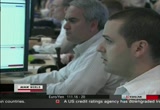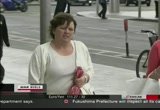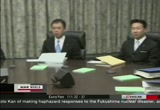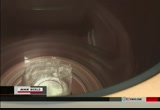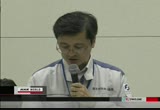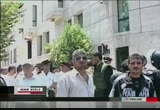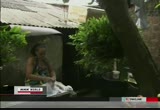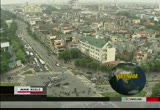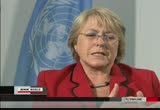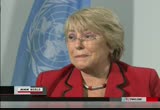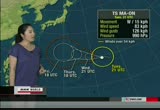tv Newsline PBS July 12, 2011 7:00pm-7:30pm PDT
7:00 pm
glad to have you on this edition of "newsline." it's wednesday, july 13th at 9:00 a.m. in tokyo. i'm catherine kobayashi. overnight in new york the dollar briefly fell to a four-month low against the yen on growing concerns over european debt. for more we go to ai uchida from our business desk. >> very good morning and thank you very much, catherine. on the new york foreign e change the dollar briefly fell to the mid 78 yen range on tuesday, on fears that the greek debt crisis may spread to other european countries such as italy and spain. moves to sell the euro and buy the yen helped to push the dollar down to a level last seen
7:01 pm
after the march 11th disaster in eastern japan. the greenback was being traded at 78.49 yen at one time. earlier in london, the dollar dipped below the 80 yen level. the dollar is currently being traded at 79.45-50 yen, whereas the euro is currently fetching 111.22-24 yen. yen buying further intensified in new york after moody's downgraded ireland sovereign debt tuesday, rated below investment grade following greece and portugal. major u.s. credit rating agency moody's downgraded irish government a notch from baa3 to ba1. the debt strapped country received a bailout package from eurozone nation. after that expires moody's said ireland will likely require
7:02 pm
additional financial aid to stay afloat. the agency added if further support becomes necessary, private investors may be asked to share the burden. now let's take a look at tokyo stocks. in new york overnight the dow was lower for a third straight day as eurozone debt problems continue to worry investors. to see how markets are trading in japan this wednesday morning we cross over to ramin mellegard at the tokyo stock exchange. ramin, how are the markets looking to far? >> good morning to you, ai. the nikkei and the topix trading in the negative in the first few minutes of trading and that follows on from the losses we saw on the dow and markets continue to be dominated by news surrounding eurozone debt concerns after moody's downgrade of ireland's credit rating which yet again highlights global concerns over the eurozone economy as a whole. we did see the dow getting pushed lower after it was boosted somewhat earlier by a little bit of optimism following the minutes of the federal
7:03 pm
reserve meeting from june which showed some of the members of the fomc or actually optimistic about taking further measures to stimulate the u.s. economy and that follows from the ending of the quantitative easing period that ended in june, so that gave a little bit of optimism, but then the eurozone debt concerns pushed markets lower. we did see the nikkei trading below 10,000 yesterday for the first time in five trading sessions, and that was weighed down by exporters which again took a turn lower because of the strengthening yen and if you look at the currency markets right now you can see the euro/yen trading around the 111 levels. earlier this morning it was trading around 110, but it actually dipped below that as well, and as you mentioned, against the dollar also having dipped below 79 at one point, now that compares with the euro/yen trading around 117 last week and just around 114 just this monday, so you can see the sudden strength in the yen following those eurozone debt
7:04 pm
concerns playing into the markets. now, concerns about the strength of the yen also comes at a time when the bank of japan having wrapped up its two-day meeting just yesterday came out and said that it sees a pickup in production and also helped by an upturn in exports and also expected a return to moderate path of recovery for the second half of the fiscal year here in japan. now the yen's strength may hamper that progress so ai a lot of turmoil in the markets and looks like the eurozone debt concerns overshadowing everything else including u.s. earnings which has just kicked off as well. back to you in the studio. >> a lot of things on the plate, ramin, thanks a lot for that. that was our market reporter ramin mellegard at the tokyo stock exchange. the head of the japanese central bank suggested european countries should allay market anxieties by coming up with
7:05 pm
reforms such as increased industrial competitiveness. masaaki shirakawa made the suggestion at a news conference tuesday, this comes at a time when european finance ministers reportedly made no progress in their talks on additional financial aid to bail out greece. credit concerns have spread from greece to italy. >> translator: the markets are concerned, as no powers for stable growth can be seen. despite the financial bailout of the eu and imf. >> shirakawa also referred to the rise of the yen against the euro and the dollar, due to the spreading credit concerns in europe. he said turmoil on the financial markets could create a downswing risk for the japanese economy. on the tokyo foreign exchange market the dollar fell to the 79 yen level on tuesday for the first time in a month. market analyst says investors see the yen as relatively stable
7:06 pm
and continue to buy the currency out of concern that the greek debt crisis may spread to other european nations. the u.s. trade deficit rose sharply in may, topping $50 billion for the first time in 31 months. the u.s. commerce department announced on tuesday that the trade deficit stood at $50.2 billion in may, up 15.1% from the previous month. it was the highest deficit since october 2008. a significant increase in the value of crude oil imports was a key factor. the u.s. trade deficit with members of the organization of petroleum exporting countries or opec rose 17.9% from the previous month. u.s. imports from japan remained stagnant due to the impact of the march 11th disaster on supplies of parts. the u.s. trade deficit with japan declined by 26.4%. and now a recap of the
7:07 pm
7:08 pm
radioactivity. this comes after radioactive cesium exceeding the government standard was detected in cattle shipped from a farm in minamisoma city. the meat has already been distributed for sale without being tested for radioactive material. >> translator: i need to discuss the issue with related ministries, agencies, and fukushima prefecture to consider testing all cattle from marked off areas of the prefecture. >> since the nuclear disaster, the farm has shipped 17 head of cattle for slaughter, 6 of which were sent to tokyo and tochigi prefectures. from there, the beef was distributed to retailers in more than eight other prefectures. the meat was not tested for radioactive material. fukushima prefecture has now decided to inspect all of the cattle in the evacuation zone around the disabled nuclear power plant, and at least one head of cattle from all other farms within the prefecture. but there are concerns that there is not enough equipment to
7:09 pm
test all the animals. the machines are also used to check pork and other meats as well as vegetables. about 90% of cattle from fukushima are sent to meat processing plants in other prefectures where local governments are responsible for the safety inspections. however, the local governments have only been able to test less than 1% of the cattle from fukushima. japan's prefectural governors have accused prime minister naoto kan of making haphazard responses to the fukushima nuclear disaster and causing public dison it tent. the governors of japan's 47 prefectures opened a two-day meeting in akita city on tuesday to discuss the country's policies on nuclear and other energy sources. >> translator: the government is discussing restarting idle reactors even though the reactor has yet to be brought under control. i must question this attitude.
7:10 pm
>> translator: the day after minister kaieda declared the reactor in saga was state prime minister kan backed him up, but before the reactor could be started he demanded stress tests. i don't know whose words i should trust. >> the governors later worked out a series of emergency recommendations for nuclear policies. they say many residents are still facing hardships, four months after the nuclear accident began at the fukushima plant. they urged the government to swiftly resolve the fukushima nuclear accident and disclose information on the disaster. they suggested that the government should ensure the safety of all the reactors in japan and called for the early enactful of a bill to require utilities to buy renewable energy. two japanese power companies are expected to apply the country's nuclear regulator for final tests of their reactors. the companies, however, have not yet received consensus from the local governments to operate.
7:11 pm
hokkaido electric power company and kansai electric power company have been criticized for running their reactors on a trial basis for two long. the trial usually lasts for one month, this occurs during the final phase for regular checkups before commercial operations are resumed. the consent of local communities is normally required. however, the two reactors have been undergoing trial runs for four months since regular checkups effectively ended after the march 11th disaster in eastern japan. the chairman of the nuclear safety commission of japan said on monday that this is not a good thing. he urged the nuclear and still safety agency to do something about it. >> translator: if a trial run is prolonged, we will conduct final tests on the reactors immediately after receiving applications from the operators.
7:12 pm
"newsline" is the place to turn to for the latest on japan, post-march 11th. we have two segments offer two unique perspectives on the fallout from the earthquake and tsunami. "nuclear watch" brings you insight and information on the fukushima daiichi nuclear crisis and "the road ahead" examines japan's efforts to recover and rebuild. don't miss "nuclear watch" and "the road ahead" on "newsline." french president nicolas sarkozy says the country will withdraw a quarter of its stationed troops in afghanistan by the end of next year. sarkozy announced the pullout as a news conference with afghan president karzai in kabul on tuesday. >> translator: afghanistan is no longer in danger of being taken
7:13 pm
over by the afghanisn. the time is now to start the drawdown of troops. >> sarkozy says the drawdown about end by 2012. sarko sarkozy's move comes as other countries are withdrawing troops from afghanistan. the united states plans to bring home about a third of its armed forces by september next year, starting this month. sarkozy is facing increasing calls at home to withdraw troops from afghanistan. next year's presidential election seems to be a key factor to reduce the french military presence. france is calling for the u.n. security council to dump the resolution condemning syrian president bashar al assad for attacking the french embassy in damascus. the attack left three french workers injured. supporters of assad stormed the french and u.s. embassies on monday. rioters damaged the french ambassador's car and broke embassy windows. the french foreign ministry
7:14 pm
criticized the security forces for improperly dealing with the attack and ignoring obligations under international law. french prime minister francois fillon said in a radio program on tuesday that president assad had gone way beyond the limit. fillon said france and other european countries are calling for the u.n. security council to adopt a resolution denouncing assad. on tuesday all 15 members of the u.n. security council approved a statement that condemns the attacks against the u.s. and french embassies in damascus. u.n. women is an organization launched in january and released its first report on july 6th, focusing on violence against women. the report says that worldwide surveys show 90% of the cases of violence against women are not reported to the police. with reports from brazil and
7:15 pm
vietnam, we show why an agency like u.n. women is needed. >> we are at that time center of at the union for domestic workers where many women come to fight for their rights. many are housemates. they report their employers treat them unfairly. >> translator: i was fired. >> translato they said they didn't care about my rights. >> reporter: among their claims, abrupt dismissal and unpaid wages. some also report sexual harassment. the u.n. says that in brazil 6 million people were as housemates. most are poor women. housemates are usually hired directly by the families they work for. so the women are easily exploited and suffer a variety of human rights abuses.
7:16 pm
38-year-old anna paola santos started working as a housemate when she was 15. she supports her five children with a monthly salary of $350. anna says her wages were not paid regularly. and that the employer's son assaulted her. >> translator: his mother called me a liar and beat me. she ordered me to get out of the house. helpless people like me can do nothing but cry ourselves to sleep. >> reporter: u.n. women have started providing support to brazilian housemates facing serious rights violations. it is hard to get a handle on the scale of the problem. even the consultation center doesn't know exactly how many women are being victimized. the u.n. agency's work has just begun.
7:17 pm
>> vietnam, one of asia's emerging economies. but in rural areas, women's safety is under threat because illegal human trafficking still goes on. 37-year-old woman lives in baksan province in northern vietnam. she and her 7-year-old son eek out a living by farming and pebbling. two years ago an aquintance asked her if she wanted a job in china. >> translator: i was told i could work in an office and make $240 to $290 a month. >> reporter: tao trusted him and decided to go. she was taken to china's fujian province, over 900 kilometers away. there tao was forced to marry a
7:18 pm
local farmer and work from morning 'til night. she said she told him she wanted to go home. she tied her to a barn post so she couldn't leave. >> translator: he said he wouldn't give me food if i didn't work. i couldn't stop crying. >> reporter: three months later, tao managed to escape and return to vietnam. women in living poverty continue to fall victim to human trafficking. some dream of going to fast-growing china to escape poverty, but they become easy prey for human traffickers. we visited a prison to interview a man convicted of human trafficking.
7:19 pm
>> translator: a woman i met when i was in china, she asked me to sell vietnamese women. >> reporter: he took a woman and received a commission of about $250. vietnam's government says 4,500 known cases of human trafficking have taken place during the past five years. and that about 75% involved smuggling of victims into china. but the actual number of total cases is believed to be higher, as many victims may not have reported their cases to authorities for fear of discrimination. >> translator: they use jobs and international marriage as bait to dupe the women. they exploit the ignorance of vulnerable people in rural areas. >> reporter: to protect women from such crimes, vietnam's
7:20 pm
government is cracking down and increasing education in farming villages, but eradicating human trafficking will remain a serious challenge as long as a wide gap exists between the rich and poor. maria yamada, nhk world, hanoi. >> so what should be done to put an end to the trafficking of women and improve their living standards? we talked to the first executive director of u.n. women, former chileian president michelle bachelet. >> one is poverty, and again, not only us, the rest of the agencies, we work very strong in trying to ensure that girls finish school because we see that when girls go to school, and study the longest period, you see less rates of early pregnancy, early marriage,
7:21 pm
and less incidents of hiv-aids. less incidents of rape. for us it is essential women, girls, finish school. the whole -- hopefully the secondary, primary and secondary school that will give her more opportunity. >> reporter: to improve situation, we need the men to understand or to change their way of thinking. >> a lot of things we can do. first of all i believe that a role has women, too. children are raised by the mothers. i think it is very important that young mothers because probably women with more experience or older mothers, it is very difficult to change their mind-set. they're not raising children anymore. women who are raising the children can also have a very important role in sending a clear message of respect for women, dignity of women. respect not only in a formal way but also in a real way in a sense of giving them the
7:22 pm
opportunities that women do deserve, in japan as in any other country of the world. women, strong women, leaders, in areas that are strong and also be upheld. i think that it is not easy. we need -- when i say it is not easy, i only want to say we need to work harder and never give up. >> that was our special coverage on u.n. women which was launched this year. now let's take a look at the global weather forecast with sumi zushi. >> hello there. time now for your weather update. let's look at asia. lots of rain developing across the region here. also keeping a close eye on tropical storm just over the pacific here. well away from land masses, but it is on a strengthening track, tropical storm ma-on, maximum
7:23 pm
wind speeds 83 kilometers per hour, expected to become a severe tropical storm by night and upgrading to a tie upon possibly by thursday evening. as you can see it's moving in a westerly direction. it can get close to the okinawa islands by the weekend, so we must keep a close eye on this storm, because it could become a powerful system. to the north we have this big high pressure system covering japan. so we're looking at intense sunshine again. but with the heat of the day, we'll certainly be seeing some sporadic afternoon showers. across china, showery weather for northeastern china, and then we've got this very long seasonal rain band affecting the korean peninsula. could get quite intense for you again, north korea as well as jiangsu and an hui, as much as 100 millimeters. flooding is going to be a big, big concern as it has been raining for days. then down towards the southern end of china it remains fairly unsettled.
7:24 pm
in and around guanxie, hainan island, plenty of showers to be had across indo china as well. 25 degrees in chongqing today. seoul 25, another rapy day. and tokyo is going to be hot and steamy at 32. now we head into north america. very long frontal system impacting north america. today we've got lots of showers developing here across the lower midwest, the plains states up towards the northern rockies. particularly severe near this low pressure system from montana and across illinois as well. significant rain to be found from nebraska as well as parts of the four corners. the flooding is also going to be a concern here. looking quite showery across the southern coast of the u.s. as well. 37 degrees in wichita today. 38 in houston, so the heat really hangs on to this southeastern portion of the u.s. for europe heavy rains impacting
7:25 pm
finland, as well as strong winds. also showers into western russia as well. over towards the west, we've got this strong low pressure system that is rapidly developing. this is going to be bringing significant rain here over a wide area. as you can see, watch out for intense showers, strong thunderstorms to break out. pockets of pink showing up for southern france, switzerland, as well as parts of germany as well. looking quite calm for parts of the british isles but lots of rain bands ushering in. temperatures will be dropping significantly. 18 degrees in london. and 19 in paris. rather chilly here. ahead of it, lots of hot air coming in from the mediterranean. that's going to be boosting temperatures. 34 degrees in vienna. 31, stays hot in the balkans as well. 35 degrees in belgrade. all right. i shall leave you with your city-by-city forecast.
7:27 pm
on the new york foreign exchange the dollar briefly fell to the mid 70 yen range on tuesday on fears that the greek debt crisis may spread to other countries such as italy and spain. moves to sell the euro and buy the yen helped to push the dollar down to a level last seen after the march 11 disaster in eastern japan. the greenback was being traded at 78.49 yen at one time. earlier in london the dollar dipped below the 80 yen level. the dollar is currently being traded at, we'll see those figures in a moment, here we are, 79.39-41, and the euro is currently at 111.28-3 and that wraps up this edition of "newsline." i'm catherine kobayashi in tokyo. thanks for joining us. g[w
263 Views
IN COLLECTIONS
KCSM (PBS) Television Archive
Television Archive  Television Archive News Search Service
Television Archive News Search Service 
Uploaded by TV Archive on

 Live Music Archive
Live Music Archive Librivox Free Audio
Librivox Free Audio Metropolitan Museum
Metropolitan Museum Cleveland Museum of Art
Cleveland Museum of Art Internet Arcade
Internet Arcade Console Living Room
Console Living Room Books to Borrow
Books to Borrow Open Library
Open Library TV News
TV News Understanding 9/11
Understanding 9/11
